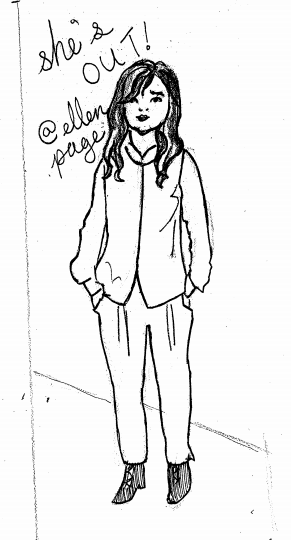
Ellen Page – a prominent actress best known for her title role in Juno – came out publicly as gay in a speech given to a Los Angeles audience last week. Online audiences have praised Page extensively, describing her speech as moving, heartfelt and inspiring. As I write this article on Friday, Feb. 20, her coming out speech has over 4 million views on YouTube. Clearly, Page’s speech has intrigued society as a whole.
Public testimonies like this empower those who are struggling with any type of societal expectation. Whether the issue is sexual, relational or personal, it is important to realize that personal struggles abound, often among the people with whom we interact daily. Page’s speech drew attention to these struggles. The American community needs well-known personalities to draw attention to unseen struggles, to speak out against hate, to spark conversation in society and to validate the feelings of those in pain.
Celebrity statements can do a lot of good. However, it’s easy to get caught up in the sensationalism of celebrities’ personal lives and forget that deciding when to come out is, ultimately, an extremely personal choice. American society may even overvalue statements such as Page’s, relying on them to generate change and conversation. This, in turn, may pressure celebrities to publicly come out before they are ready.
In upholding this expectation, Americans tend to forget that celebrities are human too, and that they have the right to decide personally when and where to come out to the public. This decision requires time, thought and reflection. Society needs to understand that everyone, including celebrities, has a right to maintain privacy for as long as they would like.
In some ways, it’s unfortunate that our society needs public testimonies to draw attention to the hurt of those with whom we interact daily. Still, the effectiveness of celebrity statements is undeniable. Even as they impact society for the better, the reality of their influence is unfair in many ways.
That being said, Page made it obvious that she was emotionally and personally ready to announce that she is gay. Page said that she has spent many years “hiding” her sexual orientation, suffering mentally, emotionally and relationally. Announcing her orientation was liberating to Page and offered her the chance to publicly support and acknowledge those who continue to suffer as she had.
If Page was truly ready to come out, as I believe she was, then her public support goes a long way. It becomes a part of a legacy of inclusivity that will only grow stronger as more people – both famous and not – publicly support those who suffer. However, it took Page a long time to get to this stage. She needed time to come to terms with her sexual orientation. Ultimately, we need to accept that celebrities are just as vulnerable as the rest of us.
In a highly mediated and sensationalist society, it becomes easy to depend on public statements to generate social change. Though these statements can do great good, they must also reflect the feelings and personal choices of those giving them.
Maggie Weiss ’16 weissml@stolaf.edu is from Excelsior, Minn. She majors in history and Spanish.
Graphic Credit: ALLI LIVINGSTON/MANITOU MESSENGER

